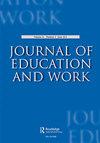‘Some people may feel socially excluded and distressed’: finnish business students’ participation in extracurricular activities and the accumulation of cultural capital
IF 1.7
Q2 EDUCATION & EDUCATIONAL RESEARCH
引用次数: 2
Abstract
ABSTRACT A growing number of scholars have investigated how extracurricular activities (ECA) are intimately tied to graduates’ positional competition and enhancement of employability. Prior studies have shown that the strategic tendency towards ECA especially applies to privileged, high-achieving students from a high-status university. Yet studies considering ECA as a site of gendered practices have been scarce. We explore how graduates have accumulated cultural capital through their lived experiences in ECA and how ECA practices construct classed and gendered dispositions and distinctions among graduates. We draw on Bourdieu’s conception of cultural capital, as well as contemporary feminist debates over gender and capital. Analysing 32 graduate interviews from four business schools in Finland, we found that through participation in student associations’ ECA, our interviewees learned distinctive values, preferences and behaviours. In addition to ‘instrumental’ cultural capital, such as leadership skills that enhance CV, ECA provided opportunities to accumulate embedded cultural capital and confirm membership/learning to become a member in the professional middle class. Moreover, especially the female interviewees learned to adjust to masculine business culture and develop aspirations towards prestigious job positions.“有些人可能会感到被社会排斥和痛苦”:芬兰商科学生参加课外活动和文化资本的积累
越来越多的学者研究了课外活动(ECA)如何与毕业生的职位竞争和就业能力的提高密切相关。先前的研究表明,ECA的战略倾向尤其适用于来自高地位大学的特权、成绩优异的学生。然而,将非洲经委会视为性别实践场所的研究很少。我们将探讨毕业生如何通过他们在ECA的生活经历积累文化资本,以及ECA实践如何在毕业生之间构建分类和性别倾向和差异。我们借鉴了布迪厄的文化资本概念,以及当代女权主义者关于性别和资本的辩论。我们分析了来自芬兰四所商学院的32位毕业生的访谈,发现通过参加学生社团的ECA,我们的受访者学到了独特的价值观、偏好和行为。除了“工具性”文化资本(如提升简历的领导技能)之外,ECA还提供了积累嵌入式文化资本和确认会员资格/学习成为专业中产阶级成员的机会。此外,尤其是女性受访者学会了适应男性化的商业文化,并对有声望的工作职位产生了期望。
本文章由计算机程序翻译,如有差异,请以英文原文为准。
求助全文
约1分钟内获得全文
求助全文
来源期刊

Journal of Education and Work
EDUCATION & EDUCATIONAL RESEARCH-
CiteScore
2.70
自引率
14.30%
发文量
40
期刊介绍:
The Journal of Education and Work is an international forum for academic research and policy analysis which focuses on the interplay of the education and economic systems. The journal examines how knowledge, skills, values and attitudes both about and for work and employment are developed within the education system. The journal also explores the various forms of industrial training and accreditation in the economic system, including changes in the economic and industrial infrastructure which influence the type of employees required. Work in the informal economy is also included.
 求助内容:
求助内容: 应助结果提醒方式:
应助结果提醒方式:


